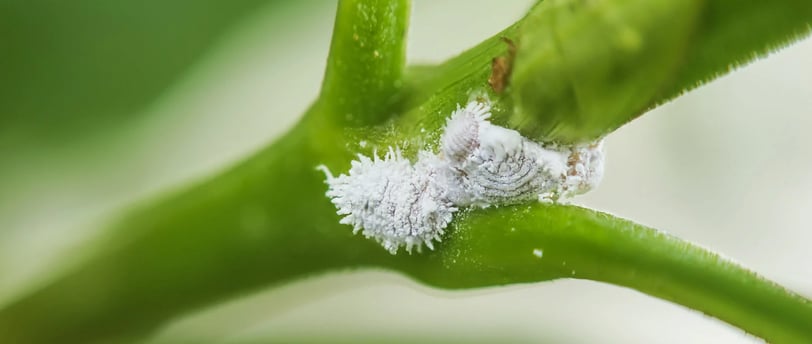Mealybugs on Herbs: How to Identify and Eliminate These White Pests
White bugs on your herbs? Learn how to identify and eliminate mealybugs naturally. Simple, effective tips to keep your plants pest-free.
PESTS & PROBLEMS


If you spot tiny, white, cotton-like clusters on your herbs—especially around leaf joints or stem bases—you’re likely dealing with mealybugs. These sap-sucking insects weaken plants over time, cause stunted growth, and invite other problems like mold.
Let’s break down how to detect them early and stop them before they take over your garden or indoor plants.
What Are Mealybugs?
Mealybugs are soft-bodied, white insects that secrete a waxy coating, making them look like fuzzy cotton on stems and leaves. They feed by piercing plant tissue and sucking out juices, leading to yellowing, curling leaves and a general loss of vigor.
Common Signs of Mealybug Infestation
White, fluffy clusters on stems, leaf joints, and undersides
Sticky residue (honeydew) on leaves or soil surface
Presence of black sooty mold growing on the honeydew
Wilting or distorted new growth
Slowed growth or plant decline
They especially love warm, humid environments—like indoor herb gardens or greenhouses.
How to Get Rid of Mealybugs (Effectively)
Manual Removal
Use a cotton swab dipped in rubbing alcohol (70%) to dab and kill visible mealybugs.Rinse Plants Thoroughly
Wash with a strong stream of water, especially under leaves and in crevices.Apply Neem Oil or Insecticidal Soap
Spray the entire plant every 3–4 days for 2 weeks. Focus on hidden spots.Prune Severely Affected Parts
Dispose of them far from your growing area to avoid spreading.Repeat and Monitor
Mealybugs are persistent—stay consistent with treatment and watch for reinfestation.
Natural Prevention Tips
Avoid over-fertilizing—mealybugs love nitrogen-rich, soft new growth
Isolate new plants before adding them to your setup
Keep humidity in check, especially indoors
Wipe plant pots and trays regularly with diluted alcohol or vinegar solution.
